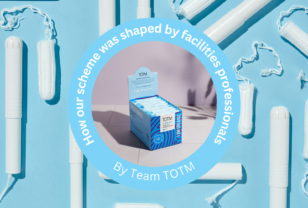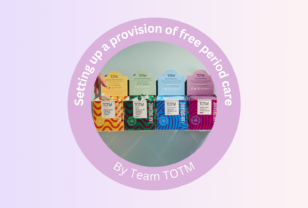Menstruation is a stigmatised topic in society often shrouded in secrecy and shame. In our Periods at Work survey series, we explored period stigma in the workplace to look at how this impacts employee wellbeing.
In our research, over 50% of our community said they do not feel comfortable discussing periods in work. Many felt that period talk is deemed ‘unprofessional’, ‘inappropriate’ or ’embarrassing.’ These concerns link to the negative perceptions and attitudes that surround menstruation.
The impact of period stigma in the workplace
Period stigma impacts women and people with periods in different ways. For starters, the lack of open dialogue can make it difficult to ask for help. If, for example, an employee needs a toilet break due to heavy bleeding they may end up suffering in silence.
Depending on the job requirements and workplace environment, periods can cause unnecessary stress. It means planning your work day around toilet breaks to change a tampon/pad, which is challenging for employees working shifts or offsite.
Alongside the logistics of managing a period, they often come with uncomfortable symptoms. In our research, a staggering 94% said that period related pain had disrupted their working day. Common PMS symptoms include menstrual cramps, muscle aches, bloating. migraines, fatigue and overheating. Menstrual conditions such as endometriosis, which impacts an estimated 1.5 million people in the UK (1 in 10 women) can cause severe symptoms. The physical and mental symptoms of a menstrual condition can impact someone’s ability to work and without support, employees living with these conditions may struggle to continue in their role. Their wellbeing needs will go unmet which leads to a wider inequality discussion.
So, how can you tackle period stigma in the workplace?
Start with free period care products
Toilet paper and soap are all staples in workplace bathrooms. Period care is just as essential as these products but it’s yet to become a priority. The absence of period care only fuels the stigma. It paints periods as a secret that’s best kept out of the workplace. As a result, we make covert missions to the bathroom with a tampon nestled up our sleeves.
Bringing in a free period care provision is a positive step towards breaking down stigma. It makes periods visible in the workplace and ensures nobody faces the stress of getting caught short. If you’re yet to introduce free period care, bringing this in presents a chance to open up the dialogue. You could notify employees with internal comms and run period-related educational workshops/talk.
Stigma-free menstrual wellbeing support
After supporting period needs through a product provision, you can take this further. It’s a chance to listen to your employees and gather feedback on what they’ll find beneficial. These insights can help you discover where support could be helpful.
From here, you could introduce menstrual policies including any extra support options. This could include remote working, menstrual leave, flexible breaks, or line manager support. Check out this blog from Business Psychologist, Clare Knox to learn more.
Period talk is welcome here
When opening up the conversation and breaking down period stigma, we recommend to:
Break the stigma by including all employees
Map out a few sessions in which all employees can attend, whether they have periods or not. Education can help with tackling negative stigma and perceptions of menstruation.
Book Line Manager specific training
Line Managers and Team Leaders can learn how to best support their direct reports with menstrual matters.
Breaking the ‘shame cycle’ through language
We always recommend steering clear of language that perpetuates period stigma. This includes:
Sanitary products, sanitary pads, or feminine hygiene
The word ‘sanitary’ and ‘hygiene’ makes it seem as though periods are dirty or unclean. We always suggest using the words ‘period care’ or ‘menstrual products.’
Period euphemisms or slang
Coded language for periods (i.e. ‘monthlies’ and ‘aunt flow’) suggests the word ‘period’ is inappropriate.
We hope these tips will help you approach tackling period stigma in the workplace. Ready to become a period positive workplace or university? Get in touch with our team to learn how we can help.







